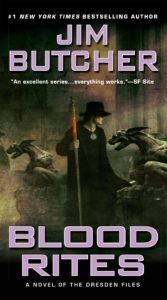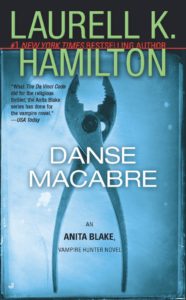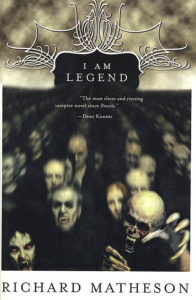I have a tendency to regularly troll a number of area Half-Price Books, looking for ever more cheap, used copies of the huge stack of Ultimate Marvel comics that I read. I end up seeing a number of other titles as a result, and grab the odd one now and again. Today’s such find, Lost & Found, was an extremely short Buffy-themed comic set more or less as an episode in Angel’s final season. In a sequel to the Gem of Amarra sequence, Spike and Angel go looking for yet another vampire that seems to be able to survive the sunlight. It’s not a bad little story, short though it be. It tries and (I think) fails to provide much in the way of character development for Spike or Angel, but if it had been the main arc of an actual episode in the show, I would have liked watching it. To be perfectly clear, it very much needed a secondary arc to have felt fully formed, though.
Tag Archives: vampires
Blood Rites
 At some point between the last Dresden Files book and this one, I got accidentally spoiled for a piece of character development between Harry Dresden and Thomas Raith, a vampire of the White Court he’s been palling around with lately. (That is, of course, a drastic simplification and barely accurate at that, but so be it.) As such, it’s going to make it tricky for me to dig into the rich thematic ground here that I would and often have plumbed with great abandon for similar situations in other works. And while I could probably still kill this paragraph and start over in a theme-based review without letting you get spoiled by the character elements, these things are mostly more about me than the actual stuff I consumed, as you will have no doubt noticed by now.
At some point between the last Dresden Files book and this one, I got accidentally spoiled for a piece of character development between Harry Dresden and Thomas Raith, a vampire of the White Court he’s been palling around with lately. (That is, of course, a drastic simplification and barely accurate at that, but so be it.) As such, it’s going to make it tricky for me to dig into the rich thematic ground here that I would and often have plumbed with great abandon for similar situations in other works. And while I could probably still kill this paragraph and start over in a theme-based review without letting you get spoiled by the character elements, these things are mostly more about me than the actual stuff I consumed, as you will have no doubt noticed by now.
After reading five previous novels, what I find that has been the most glaringly absent from the series, the single thing I could point at and say, “Where’s that?”, is porn. Thankfully, Blood Rites has solved this problem to my satisfaction. It’s like, you can only read so many books in a series and remain interested before someone puts some porn in there, am I right? And at long last, there Harry is, surrounded by women in lingerie, watching the cameramen and the boom operators as the director tries to get the shot just right. Because, porn![1] So, um, anyway, Harry is hired to clean up a little bit of entropy that has gotten all over the porn studio.[2] And as the formula dictates, he finds all too rapidly that he’s in something way over his head. Because, there’s the porn and the thing with Thomas, sure, but there’s also more fallout from the war between the wizards and the less pleasant vampires of the Red and Black courts, and at last a little bit of overt sexual tension between Harry and his long time CPD contact, Karrin Murphy.[3]
Plus, bonus awesome evil-detecting puppy!
[1] Oh, hey. You didn’t think I meant, y’know, a gradual devolution of the ongoing plotlines until all that’s left is a series of orgies “held together” by a pregnancy scare? Jesus, that would be a terrible book.
[2] Ew.
[3] I grew up on Moonlighting. Sue me.
Danse Macabre
 So, here’s a possibly interesting tidbit about Danse Macabre. When I first knew of its existence in hardback, I wasn’t yet halfway through the series, and it looked like a lot of change was in store ahead. Anita was going from a zombie animator and vampire killer and unofficial detective to federal marshal? Cool beans! Pregnancy scare? Sure, fair enough, she’s got a boyfriend and maybe a second one. This would have been 2006, I guess?
So, here’s a possibly interesting tidbit about Danse Macabre. When I first knew of its existence in hardback, I wasn’t yet halfway through the series, and it looked like a lot of change was in store ahead. Anita was going from a zombie animator and vampire killer and unofficial detective to federal marshal? Cool beans! Pregnancy scare? Sure, fair enough, she’s got a boyfriend and maybe a second one. This would have been 2006, I guess?
Also, that probably wasn’t interesting at all, but it was pretty much the only thing I could think of to type that wouldn’t be dripping with vitriol, and it seems fair to give my readers a safe haven wherein they can decide to not keep going.
Because, Jesus God, this is a fucking terrible book. It spans 48 hours leading up to a vampire ballet performance, which latter part might have been pretty cool to watch, I guess? It was ten of the maybe fifteen pages where I didn’t want to claw my eyes out of my head while reading it, anyway, so I can’t help but look upon the scene fondly, y’know? In the meantime, there are these five hundred pages spanning these 48 hours, in which nothing of any interest happens. Anita might be pregnant, and she’s going to be sure to be strong about it except for fighting with all of her friends, or maybe that should be the definition of strength instead of an exception. But she also just might carry a bunch of impossible virii and be way stronger than anyone yet suspects, instead of being pregnant. All those Master Vampires they’ve invited to town for the ballet might have been a bad scary idea that will destroy their lives, or maybe they’ll gain all kinds of new power by having giant vampire orgies instead. She’ll certainly have to manage the expectations and feelings of her myriad emotionally crippled boyfriends, sure the normal ones like Richard and Nathaniel and Jason, but let’s not forget all the awesome non-names we can throw around, like Haven or Wicked or Truth or London or Asher or for fuck’s sake Requiem! And as if that weren’t bad enough, the Master of Chicago is named Augustine, which would be like a breath of fresh air except that he’s older than perennial fan favorite Jean Claude, and yet everyone calls him Auggie. AUGGIE!!!!
It’s like… well, I know I’ve mentioned Mary Sue before, but to sum up right quick, Mary Sue is a character in Star Trek fan fiction from probably the ’70s, who was written as a stand-in for the author, and she shows up every main character you’ve heard of on the Enterprise, she’s the one person with all the special skills and talents to save the day, plus pretty much everyone wants her in the worst way. It’s not that Anita Blake is a Mary Sue kind of character. It’s not THAT SIMPLE. It’s like, in these last few books, Anita Blake is the character that the original fictional Mary Sue would have written, if she herself were an author in addition to her many space-faring talents.
The worst part? I actually finished the book. I don’t exactly know how. I mean, at the beginning, I wasn’t angry, I just wanted to quit because it was so unpleasant. But it felt at that point like I was having an unfair personal reaction to some story elements, so I persevered. Eventually the relief of that part of the plot fading out of prominence got me through the interminable middle section in a bull-rush. And by the time I realized that every time I read more than a page at a sitting, I got angry, I was a) almost finished and b) didn’t have access to the next book I wanted to read. And by the time I solved that problem, I was really almost finished, and the old idiotic completionism had kicked in. But, seriously, I think I accidentally got a little drunk on Wednesday night because I was reading, and if I couldn’t focus on the book, I wouldn’t have to read anymore. I don’t so much no longer care about these characters as I sincerely want them all to die in a fire. And I’m in the unique position of being able to make that happen. But it seems like I shouldn’t?
Anyway. Here’s what does happen: Anita gets threatened in dreams by the First Evil, or the Queen of the Damned, or someone like that. The Mother of Night, there we go. Anyway, she’s the very first vampire, and she’s been waking up gradually for a few books now. And then later, Anita talks to a guy who was made a vampire by that one chick, and who might be the Arthurian Merlin instead of just a vampire with a similar name, and who is certainly the first dude in a long time that might be more powerful than our merry band of sex-starved heroes. Which might matter, except he wants to sign on with them instead of oppose them? I guess I just ruined the book, but if I can tell you every single plot event that occurred in only two-ish sentences, it may just be that someone else ruined the book first.
God! I can’t stop being pissed off about this!
And all the fucking horrible verbal tics! “That wonderful Gallic shrug that meant everything or nothing.” “[This or that sexual pecadillo] just flat did it for me.” The repetition between thought and action, along the lines of, say, someone asks a question, then our author types, “I didn’t know the answer to that. ‘I don’t know the answer to that,’ I said.” I mean, the first few and others that I thankfully can’t recall offhand, there’s no reason for you to read them and understand how, after a dozen books of the same phrases over and over again, I am boiling with fury at the memory. But that last repetition thing? Who is possibly allowed to write like that?!
Okay. Okay. I’m stopping now. Fuck!
I Am Legend
 Several weeks ago, a friend of mine recommended a horror author I’d managed to never hear of, Richard Matheson. I found a copy of A Stir of Echoes in my local Half Price Books, and I later read it all in one afternoon, while I was stuck at home watching the floor guy take up all of my downstairs linoleum. I’d seen the movie, and the book was largely the same, but just different enough to keep the mystery in real doubt all the way through. In any case, I enjoyed myself. Part of it was reading a book in one day, something I haven’t done in, well, I sincerely cannot remember how long.
Several weeks ago, a friend of mine recommended a horror author I’d managed to never hear of, Richard Matheson. I found a copy of A Stir of Echoes in my local Half Price Books, and I later read it all in one afternoon, while I was stuck at home watching the floor guy take up all of my downstairs linoleum. I’d seen the movie, and the book was largely the same, but just different enough to keep the mystery in real doubt all the way through. In any case, I enjoyed myself. Part of it was reading a book in one day, something I haven’t done in, well, I sincerely cannot remember how long.
In any case, I finally got to a better stocked HPB and found several more of his books, mostly in Penguin-sized short story collections. The one I’d been looking the most forward too was I Am Legend, the story of the last man alive in a world full of vampires. As it happens, the copy I got is about half that, and about half several more short stories, which I have yet to read.
Good story, though. In addition to Matheson’s drive to find a scientific explanation for every vampire characteristic, he explores themes of isolation in familiar but well-written ways and themes of identity in ways that I hadn’t considered before. What makes a man good? What makes a vampire bad? Is it possible to cross those lines? Is it desirable to?
I know that I just said it was cool to read a book in a day (and I could have done with this one, although I did not), but the one weakness I found was that I was never able to get all the way into the head of the main character. The whole story was from his point of view, and I didn’t really feel like I knew him any better by the end than I did in the first ten pages. He was an excellent means to Matheson’s multiple ends, but I’m not convinced he was more than that. I actually felt more for the three main ancillary characters than I did for Robert Neville or his (expired, at the opening of the story) family.
For now, though, I have all those short stories left to read.